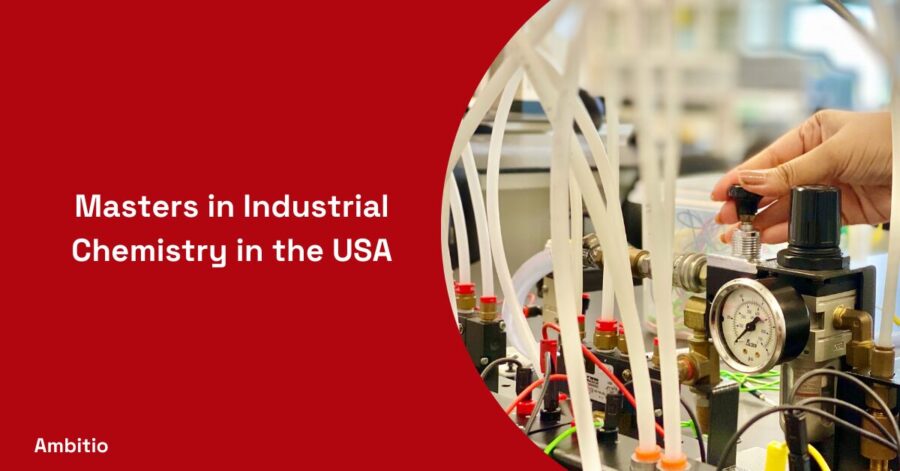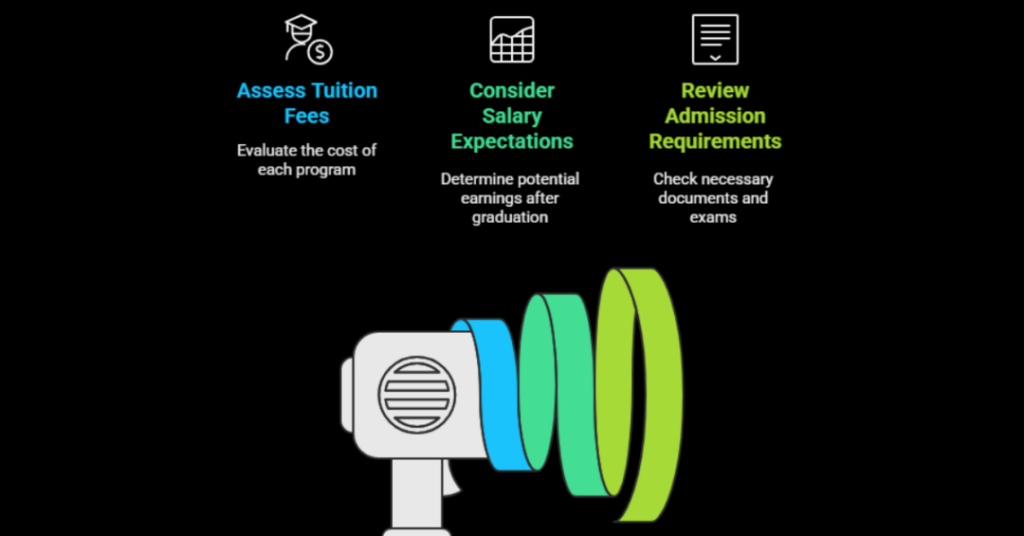11 September 2025
7 minutes read
Everything You Need To Know About Masters Of Science In Industrial Chemistry In USA

Key Takeaways
- Masters in industrial chemistry in USA requires careful planning of coursework, electives, and research to build a strong career path
- Top universities offer varying tuition and financial aid so compare programs before applying
- Admission demands strong GRE scores, SOPs, LORs, and awareness of deadlines to secure a spot
In 2024, over 8,000 students jumped into a Master of Science in Industrial Chemistry in the U.S., but many quickly realized it’s less “shiny lab coat” and more “all-nighters with polymers and inorganic equations.” I’ve seen students sink under tuition, missed deadlines, and electives that led nowhere.
The smart ones map their coursework early, grab fellowships or financial aid, and align with the right department of chemistry. That’s how this degree stops being just another graduate program and turns into a real career path.
What Industrial Chemistry Is All About?
You know, I do not want to give you spoilers on what your job role might look like… but still, let me give you a quick heads-up so you understand if you actually want to pursue a Master of Science in Industrial Chemistry and whether the grind is worth it.
• Industrial chemistry isn’t only about reactions; it mixes analytical chemistry, physical chemistry, and inorganic chemistry with real-world problem solving that directly impacts industries.
• A graduate program here will test more than your memory; expect coursework with calculus, polymer studies, and biochemistry tied into interdisciplinary research.
• Miss a deadline or ignore GRE scores and admission requirements, and your dream degree program could slip, no matter how good a graduate student you are.
• The department of chemistry at places like the University of Louisiana at Lafayette isn’t just about labs; it pushes you to specialize through the right elective, balancing tuition, financial aid, and fellowship options.
• Done right, graduate studies in this field open a career path that spans chemical engineering, environmental impacts, and industry-driven research, giving you skills that go far beyond textbooks.
10 Top Universities To Study Masters In Industrial Chemistry In USA
One of the most common mistakes I see to this day is students chasing “big names” without looking at tuition, admission requirements, or the career path afterwards. I still remember a student who ignored deadlines and didn’t send GRE scores on time, only to miss out on a great department of chemistry that would have given him fellowships and industry exposure.

That’s when I realized: the right graduate program in science in industrial chemistry isn’t about a fancy nameplate, it’s about matching your budget, goals, and the opportunities the university actually provides.
Here’s a quick breakdown of the top universities offering a Master of Science in Industrial Chemistry in the U.S., so you can weigh your options smartly.
| University | Avg. Tuition Fees (per year) | Avg. Salary After Graduation | Docs/Exams Required |
|---|---|---|---|
| University of Louisiana at Lafayette | $18,000 | $78,000 | GRE scores, TOEFL/IELTS, SOP, LORs |
| University of Akron | $20,500 | $80,000 | GRE scores, TOEFL/IELTS, Resume, SOP |
| Illinois Institute of Technology | $28,000 | $85,000 | GRE scores, TOEFL/IELTS, SOP, LORs |
| University of Houston | $22,500 | $82,000 | GRE, TOEFL/IELTS, Statement of Purpose |
| Michigan Technological University | $24,000 | $84,000 | GRE, TOEFL/IELTS, Transcripts, SOP |
| Stevens Institute of Technology | $31,500 | $90,000 | GRE, TOEFL/IELTS, LORs, Resume |
| University of Kansas | $21,000 | $79,000 | GRE, TOEFL/IELTS, SOP, Transcripts |
| New Jersey Institute of Technology | $30,000 | $88,000 | GRE, TOEFL/IELTS, Statement, LORs |
| University of Toledo | $19,500 | $77,000 | GRE, TOEFL/IELTS, SOP, Resume |
| Cleveland State University | $18,800 | $76,000 | GRE, TOEFL/IELTS, Transcripts, SOP |
What Are The Admission Requirements For Chemical Engineering Graduate Program?
I’ve lost count of how many students told me, “I didn’t know the GRE scores mattered that much,” or “Nobody told me the statement of purpose could make or break my application.” And honestly, that’s what I have seen: most people applying for a chemical engineering graduate program obsess over GPA and completely ignore the documents that actually get their applications shortlisted.
I’ve seen brilliant students miss deadlines, underestimate how specific the department of chemistry wants their research plan, or submit cookie-cutter SOPs that scream “reject me.”
Here’s the real list of admission requirements you cannot afford to screw up:
| Requirement | Why It Matters | Insider Note |
|---|---|---|
| GRE Exam | Still required in many schools, especially top-tier chemical engineering programs | A 320+ isn’t “optional” if you want funding or fellowships |
| TOEFL/IELTS | Proof of English proficiency | Aim higher than the minimum; low scores kill fellowship chances |
| Statement of Purpose (SOP) | Defines your research goals and fit with the department of chemistry | Generic SOPs = instant rejection. Customize for each university. |
| Letters of Recommendation (LORs) | Professors vouching for your ability in chemical engineering, physical chemistry, or research | At least one LOR should highlight lab or project work |
| Resume/CV | Your academic, research, and industrial chemistry experience | Tailor it—listing irrelevant internships is a waste |
| Transcripts | Proof of academic performance | Some schools want notarized copies—check early to avoid deadline chaos |
| Research Proposal (for some programs) | Shows alignment with faculty expertise | Mention potential faculty you want to work under |
| Financial Docs | For visa and tuition verification | Even if you plan on financial aid, universities need proof of funds upfront |
What is the Cost Of Studying Masters in USA?
Hmmm… money… I’ll tell you a story. Short one.
A student once came to me all excited about his Master’s in USA, thinking tuition was the only thing he had to worry about. Three months in, reality slapped him, health insurance, lab fees, housing near campus, and even those “tiny” semester supplies drained his savings faster than expected.

That’s when he and I realized the hidden costs often hurt more than the visible ones.
Here’s the real breakdown of expenses you need to budget for when planning your master’s degree in the U.S.:
| Expense Category | Average Cost (Per Year) | Notes You Shouldn’t Ignore |
|---|---|---|
| Tuition Fees | $20,000 – $50,000 | Varies by university and program; STEM courses often lean higher |
| Living Expenses | $10,000 – $18,000 | Rent depends on city; Boston, NYC, LA are brutally expensive |
| Health Insurance | $1,500 – $2,500 | Mandatory at most universities; waivers are rare |
| Books & Supplies | $800 – $1,500 | Lab-intensive programs like chemical engineering can push this higher |
| Transportation | $800 – $1,200 | Public transit is cheaper; car ownership = financial nightmare |
| Miscellaneous/Personal | $2,000 – $4,000 | Includes clothing, phone, weekend food splurges (yes, they add up) |
| Student Fees | $500 – $1,200 | Technology fees, library access, lab maintenance—non-negotiable |
| Application & Exam Costs | $1,000 – $1,500 (one-time) | GRE, TOEFL/IELTS, application fees, transcript evaluation |
What Are The Available Scholarships And Financial Aid Programs?
And to the expenses you saw above, this is the answer. Scholarships. They’re the only thing standing between you and drowning in tuition bills, insurance costs, and those sneaky semester fees.
Most graduate students ignore them until it’s too late, but I’ve seen how a single fellowship or assistantship can slash expenses by half and completely change someone’s study-abroad journey.
Here are some of the most sought-after scholarships and financial aid options for a Master’s in USA:
| Scholarship / Aid Program | Coverage | Key Eligibility |
|---|---|---|
| Fulbright Foreign Student Program | Full tuition, living stipend, health insurance | Strong academics, leadership potential, admission to a U.S. university |
| AAUW International Fellowships | $20,000–$30,000 | Open to women pursuing graduate studies in the U.S. |
| Joint Japan/World Bank Graduate Scholarship | Tuition, living costs, airfare | For students from developing countries with work experience |
| Graduate Assistantships (RA/TA) | Tuition waiver + stipend | Offered by universities for teaching or research work |
| Inlaks Shivdasani Foundation Scholarships | Up to $100,000 | Indian students with admission to top U.S. universities |
4 Tips That Changes Everything
After all these things, if I have to tell you what you should do is focus on the details that nobody tells you when chasing a master’s program in the U.S. These are the exact things that separate the international students who make it in top universities from the ones who keep struggling with tuition fees, application deadlines, and an endless application process.
Here are 4 secret things that I tell to my students:
1. Scholarships Are The Game Changer
Over 55% of international students in U.S. graduate studies rely on some form of scholarship, assistantships, or financial aid options. If you wait until the end of the application and admission cycle, you lose. Apply early, because RA and TA spots tied to funding options are filled within weeks.
2. Credit Hours Control Your Degree
Most industrial chemistry programs demand 30 to 36 credit hours. That means every elective counts. Don’t waste them. Pick courses including organic chemistry, medicinal chemistry, and cosmetic chemistry that align with your chosen career path instead of chasing “easy grades.”
3. Faculty Members Decide Your Research Value
Close to 70% of graduate students who land industry jobs had strong letters of recommendation linked to research projects with faculty members. Whether it’s mastering chemical methods widely used in area industries or gaining access to research facilities, who you work with in the chemistry program directly shapes your outcomes.
4. Admission Is More Than GRE Scores
Yes, official GRE scores above 310 matter, but committees weigh more on your research opportunities, career goals, and personal and professional clarity. A sharp SOP showing how your background in chemistry connects to the chemical industry or an institute of technology carries more weight than one extra math point.
That’s what defines your potential for success in graduate studies and even a future Ph.D.
Conclusion
You now know what the field actually involves, the top universities offering it, the admission requirements, the costs you’ll face, and the scholarships and financial aid that can make it manageable. With around 30–36 credit hours, a heavy mix of analytical, inorganic, and physical chemistry, and research tied to industry needs, this degree is built to prepare you for roles in the chemical industry, research, or even a future Ph.D.
To get into a top U.S. university isn’t just about grades, it’s about strategy. Ambitio’s AI-powered platform and expert consultants help you tackle applications, study gaps, and visa approvals with confidence. No confusion, no wasted time—just a clear path to your dream school. So if you want to study in USA, Ambitio is the answer.
FAQs
What are the prerequisites for a Master’s in Industrial Chemistry in the USA?
A bachelor’s degree in chemistry or a related field, a strong academic record, language proficiency (TOEFL/IELTS for non-native speakers), and often GRE scores.
How long does it take to complete the program?
Most Master’s in Industrial Chemistry programs in the USA take about two years to complete.
Are there scholarships or funding options available for international students?
Yes, many universities offer scholarships, assistantships, and financial aid options for international students. It’s important to research and apply early for these opportunities.
What career opportunities are available after completing a Master’s in Industrial Chemistry?
Graduates can pursue careers in chemical manufacturing, research and development, quality control, environmental science, academia, and more.
Is it necessary to have research experience before applying for the program?
While not always mandatory, research experience can strengthen your application and prepare you for the rigors of a graduate program.
Can I work while studying for my Master’s in Industrial Chemistry?
Many students take up part-time jobs or assistantships, but it’s essential to balance work commitments with academic responsibilities. Check with your university for any restrictions or guidelines.

You can study at top universities worldwide!
Get expert tips and tricks to get into top universities with a free expert session.
Book Your Free 30-Minute Session Now! Book a call now




























